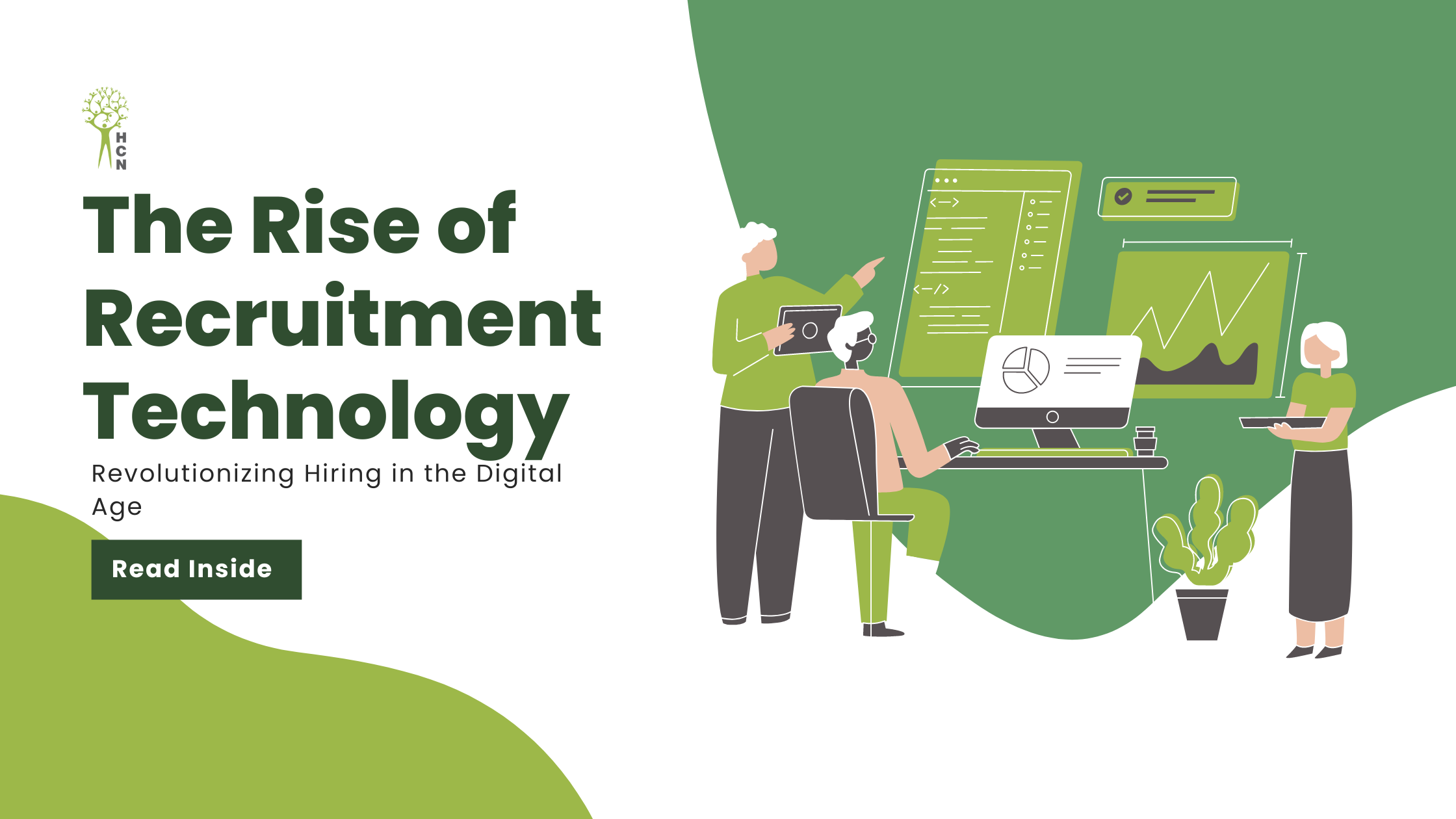Imagine you’re a hiring manager, drowning in a sea of resumes. Your inbox is overflowing, your desk is buried under paper applications, and you have a nagging feeling that you might be missing out ongreat candidates simply because you can’t process them all.
Sound familiar? This scenario, once a common nightmare for HR professionals, is rapidly becoming a thing of the past thanks to the rise of recruitment technology.
In today’s fast-paced business world, finding the right talent quickly and efficiently is more crucial than ever. Enter recruitment technology – a game-changing suite of tools and platforms that are revolutionizing how companies attract, evaluate, and hire talent.
But what exactly is driving this technological shift, and what does it mean for job seekers and employers alike? Let’s dive in.
Problems Recruitment Technology is Solving
Time-Consuming Manual Processes
Sarah, an HR manager at a mid-sized tech company, used to spend 70% of her time screening resumes and scheduling interviews. Now, with an AI-powered applicant tracking system (ATS), she’s cut that time down to 30%, allowing her to focus on strategic HR initiatives.
Unconscious Bias in hiring
Despite best intentions, human recruiters can fall prey to unconscious biases. Recruitment technology offers blind screening options and AI-driven assessments that focus purely on skills and qualifications, helping to level the playing field.
Skills Verification
Traditional methods of verifying candidate skills are often unreliable and time-consuming. Recruitment technology, such as AI-driven assessments, ensures accurate and efficient skills verification. Platforms like HackerRank provide coding challenges that objectively measure a candidate’s programming skills.
Cultural Fit Assessment
Finding candidates who fit your company culture is like finding a needle in a haystack. Advanced algorithms and AI tools help assess cultural fit more effectively than traditional interviews. Companies like HireVue use AI to analyze video interviews and evaluate candidates’ soft skills and cultural alignment.
Enhanced Candidate Experience
John applied for his dream job but never heard back. Unfortunately, his experience is all too common. Recruitment tech is changing this with automated updates, chatbots for instant answers, and streamlined application processes. For example, chatbots like Olivia automate tasks, answer candidate queries, and schedule interviews.
Data Security and Privacy
With rising concerns over data breaches, recruitment technology ensures compliance with data protection regulations through encryption, secure access protocols, and regular security audits.
Platforms like Deel offer legal support in over 140 countries, ensuring secure handling of candidate information.
Drivers of Recruitment Technology Adoption
- The push towards recruitment technology isn’t happening in a vacuum. Several key factors are driving this revolution:
- Digital transformation across industries has set new expectations for efficiency and data-driven decision-making.
- Tight labour markets and skills shortages are forcing companies to cast wider nets and move quickly to secure top talent.
- Increasing focus on diversity and inclusion has companies looking for ways to reduce bias and broaden their talent pools.
- The rise of remote work and global talent pools has expanded the scope of hiring, necessitating new tools to manage international recruitment.
Current Trends in Recruitment Technology
As we navigate this new landscape, several trends are shaping the future of hiring:
AI-Powered Candidate Matching
PwC utilized AI-powered candidate assessments to streamline and enhance their hiring procedures, achieving a remarkable 300% increase in efficiency.
Video Interviewing and Asynchronous Assessments
With the global shift to remote work, video interviews have become the norm. But it goes beyond simple video calls. Asynchronous video interviews allow candidates to record responses to preset questions, giving recruiters flexibility and candidates a chance to put their best foot forward.
Chatbots for Candidate Engagement
24/7 availability is the new standard. AI-driven chatbots are handling everything from answering FAQs to scheduling interviews, ensuring candidates always have a point of contact.
Predictive Analytics for Performance and Retention
By analyzing vast amounts of data, companies are now able to predict which candidates are likely to perform well and stay with the company long-term.
Blockchain for Credential Verification
Say goodbye to degree fraud. Blockchain technology is making it possible to instantly verify educational and professional credentials, streamlining background checks and ensuring the authenticity and accuracy of candidate credentials.
Gamified Assessment Tools
Gamified tools are being used to assess candidate skills in an engaging and interactive manner, providing a more accurate evaluation of their capabilities. Platforms like Pymetrics use neuroscience-based games to evaluate candidates’ cognitive and emotional traits.
Augmented Reality for Virtual Office Tours:
Augmented reality provides candidates with virtual tours of company offices, offering an immersive experience of the company culture. This trend is gaining popularity among companies looking to enhance their employer brand.
Implications and Benefits
The implications of this technological revolution are far-reaching:
- Faster hiring processes mean companies can secure top talent before the competition.
- Improved quality of hires through better matching and assessment leads to higher productivity and lower turnover.
- Enhanced candidate experience results in stronger employer branding and a larger pool of quality applicants.
- More diverse and inclusive workforces are possible when bias is reduced in the hiring process.
- Data-driven insights allow for strategic workforce planning, helping companies stay ahead of talent trends.
As technology evolves, there is a growing need for continuous learning and upskilling to keep up with the latest trends and tools. Companies must invest in training programs to ensure their recruitment teams are equipped with the necessary skills.
Challenges and Concerns
However, it’s not all smooth sailing. Several challenges loom on the horizon:
Privacy and Data Protection
As companies collect more data on candidates, concerns about privacy are growing. Imagine a scenario where an AI analyzes your social media profiles without your knowledge – it’s a reality that’s raising ethical questions.
Algorithmic Bias
While AI can help reduce human bias, poorly designed algorithms can perpetuate or even amplify existing biases. Ensuring fairness in AI systems is an ongoing challenge. Regular audits and updates of AI tools are crucial to maintaining fairness.
Balancing Human Touch and Automation
How much automation is too much? Companies must find the right balance to ensure the hiring process remains personal and engaging. Over-reliance on technology can lead to a loss of the human touch, which is essential for building relationships and assessing cultural fit.
Technology Adoption and Change Management:
Implementing new technologies can be met with resistance. HR teams need support and training to effectively leverage these new tools.
Cost of Implementation:
While large corporations can afford cutting-edge systems, smaller businesses may struggle with the initial investment, potentially creating a technological divide in hiring capabilities.
Keeping Up with Rapid Technological Changes
The fast pace of technological advancements requires continuous training and development, which can be time-consuming and costly. Companies need to stay updated with the latest tools and trends to remain competitive.
The Future of Recruitment Technology
Looking ahead, the future of recruitment technology is both exciting and transformative:
Integration of Advanced Technologies
Future advancements may include the integration of AI, machine learning, and augmented reality to provide even more efficient and candidate-friendly recruitment processes. These technologies will continue to evolve, offering new possibilities for enhancing the recruitment experience.
Virtual and augmented reality assessments will allow candidates to demonstrate skills in simulated work environments.
Hyper-personalized candidate experiences will tailor the application process to individual preferences and backgrounds.
Predictive modeling for workforce planning will help companies anticipate hiring needs before they become urgent.
Ethical AI and explainable algorithms will become standard, ensuring transparency in the hiring process.
Seamless integration with other HR technologies will create a holistic ecosystem for talent management.
Focus on Cybersecurity
As cyber threats increase, there will be a greater emphasis on implementing robust cybersecurity measures to protect data. Ensuring data privacy and security will be paramount for maintaining candidate trust.
Increased Demand for Specialized Talent
The growing use of AI and other technologies will drive demand for specialized talent, such as data scientists and machine learning experts. Companies will need to invest in finding and retaining such talent to stay ahead in the competitive market.
Conclusion
The landscape of recruitment is changing rapidly, driven by technological innovations that promise to make hiring faster, fairer, and more effective. For job seekers, this means new ways to showcase their skills and connect with opportunities. For employers, it offers tools to find the right talent in a competitive market.
However, as we embrace these new technologies, we must also be mindful of the challenges they present. The key lies in harnessing the power of recruitment technology while maintaining the human touch that is so crucial in building strong teams and organizations.
As we look to the future, one thing is clear: the companies that adapt to and leverage these new tools will have a significant advantage in the war for talent. The question is no longer whether to adopt recruitment technology, but how to do so effectively and responsibly.
Are you ready to revolutionize your hiring process? The future of recruitment is here, and it’s digital.




